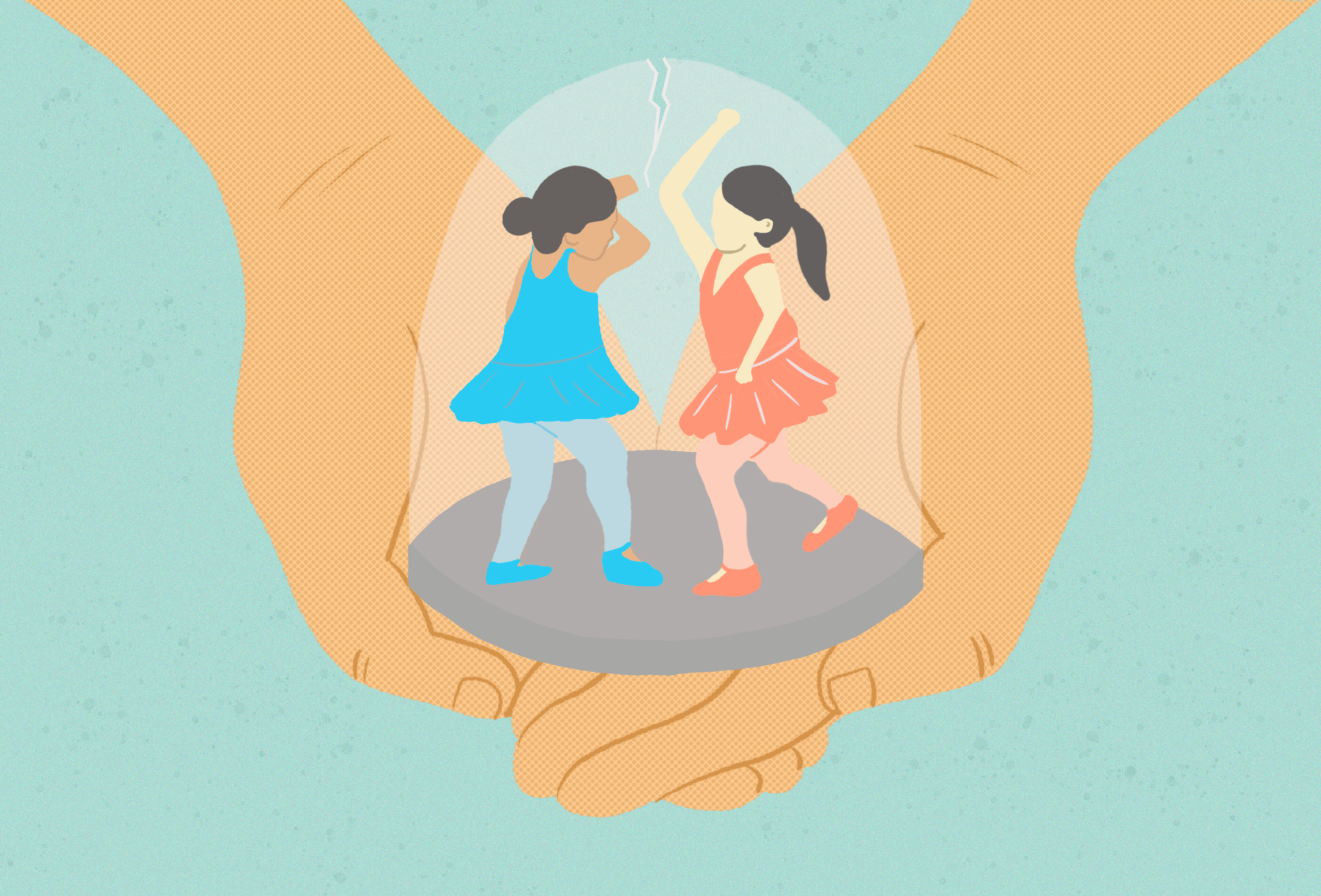
My daughter is almost 3 and took a ballet class with other kids her age on Saturdays. During class, one girl slapped my daughter in the face and the girl\’s father said and did nothing. The teacher was a bit green and did nothing as well. My husband lost his temper with the other dad and the teacher, which was hard not to do. How should we have responded in the moment and what can we do if something like this happens again?
Dear Angry Dance Mom,
When any of us witnesses our child getting hurt—no matter the circumstances—it fires up our primal protective instincts. I agree that the other girl's father bears the burden of discipline, and I imagine the teacher was also surprised he didn't intervene. No wonder your husband was angry and frustrated with this threat to your child combined with non-responsiveness from the other adults.
Although I completely understand your husband's emotional response, I can't help but think about what it was like for a room of 3-year-olds to watch a grown-up lose his temper. With that in mind, this can be a learning moment for all to react differently in the future. It may not be exactly a slap in ballet class, but a similar moment could happen with any of our kids, and the more we think about it ahead of time, the more prepared we will be.
View it From a Child\’s Perspective
We all know 3-year-olds are not famous for self-restraint. This child had a big feeling that fired her brain into an aggressive impulse, and she nor we may ever understand why. This is exactly why adults are around! Can you imagine an island of 3-year-olds left to their own devices? Pure mayhem. So, just because an impulsive slap may be normal behavior, she needs to learn that it is not safe or accepted behavior.
It's good for us to remember our children—and other people's children—are always watching. It may not feel this way when they will not ever put their toys away despite watching us do it hourly, but they really are paying attention to how we respond, especially in stressful situations. If the 3-year-old slapper sees an adult lose his temper, she's not learning what she needs to do in that moment.
Stay Calm
If the parent of the offending child does not intervene, you can. Step in and ask your daughter if she's okay; I imagine she's having her own tearful reaction! Calmly say to the other child that it looks like she hurt your daughter and made her sad. Hopefully, taking action in this way cues the teacher and other parent to also do or say something. Your calm response also reassures your child that everything is under control.
I selfishly love your question, because it gives me an opportunity to preach one of my favorite sermons: the value of mindfulness, and how it can be immensely helpful in parenting. After about 2,500 years of existing around the world, mindfulness is cool again! In the nutshell-iest explanation ever, mindfulness practice helps our brains stay calm in stressful situations that elicit strong emotions. Ultimately, this degree of calm helps us react better.
How does it work? To summarize hundreds of years of teachings, mindfulness practice develops a strong awareness of thoughts and feelings in the present moment. The very act of acknowledging in the moment, "my anger is rising and I could lose control; I want to slap that father just like his kid slapped mine," paired with taking some deep breaths to feel less angry, helps us respond more effectively.
What helps us get to this point of self-control is another of my favorite topics: meditation. A meditation practice over time really does change our brains, resulting in less reactivity even with strong emotions and negative thoughts. Since I have amped up my own meditation practice, I can attest to being much less yell-y with my kids, which is truly a win-win. When we practice even in the mundane parts of our daily lives, we are more prepared for those crisis moments of parenting. You can take some time at home to practice meditating by using an app like MyLife Meditation that also has meditation sessions for kids.
If There\’s a Next Time…
As evolved as you might become from mindfulness and meditation, you also want to be prepared if a similar incident to the slapping happens again. If there's a repeat, the issue becomes more of a structural problem. Each child in the class deserves to feel safe, and repeated aggressive behavior that is not appropriately addressed by adults interferes with this feeling of safety.
If this child hurts your child again, follow the strategies discussed above to address it while staying calm. Then, approach the teacher outside of class and express concerns. Find out what steps they have in the dance program to address preschooler behavior problems. The staff and program need to set limits with the other family, including clear expectations that aggressive behavior during class is not allowed.
There's no question we will all be in positions to protect our children, physically and emotionally. Equally certain is that the better we handle it, the better they are actually protected.
Submit your parenting questions here, and they may be answered in future 'Ask Your Mom' columns.
Emily Edlynn, Ph.D., is the author of The Art and Science of Mom parenting blog and a mother of three from Oak Park, Illinois. She is a clinical psychologist in private practice who specializes in working with children and adolescents.
Read More Ask Your Mom columns here.

